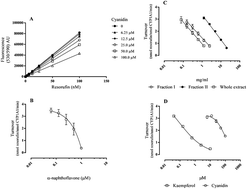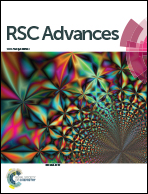Relationships of Echium plantagineum L. bee pollen, dietary flavonoids and their colonic metabolites with cytochrome P450 enzymes and oxidative stress
Abstract
Echium plantagineum L. bee pollen is a dietary source of flavonoids, which can play a protective role in the gastrointestinal tract by modulating cytochrome P450 (CYP) biotransformation enzymes and by opposing oxidative stress. Two fractions of E. plantagineum bee pollen phenolic extract, enriched in either flavonols (fraction I) or anthocyanins (fraction II), a whole extract and a prototype flavonoid of each class with a colonic metabolite were evaluated in a cell-free system for their potential to inhibit the activity of CYP enzymes expressed by human enterocytes. The superoxide scavenging potential of the individual compounds, along with their ability to protect Caco-2 cells subjected to oxidative stress induced by t-BHP, was also evaluated. CYP1A1 and CYP3A4 activity was efficiently inhibited by the three extracts. Fraction I, nearly devoid of anthocyanins, was almost as active as the whole extract, while fraction II, enriched in anthocyanins but with lower amounts of flavonols heterosides, was the less active. Among prototype phenolics, kaempferol was the best CYP1A1 inhibitor and cyanidin was the most active against CYP3A4, while their colonic metabolites p-hydroxyphenylacetic acid and protocatechuic acid were inactive. In accordance with this result, cyanidin and, to a less extent, kaempferol protected Caco-2 cells against t-BHP, which is bioactivated by CYP enzymes. A direct antioxidant effect could also contribute to the afforded protection, since both compounds were able to scavenge superoxide radicals in a cell-free system, cyanidin being the most active.


 Please wait while we load your content...
Please wait while we load your content...